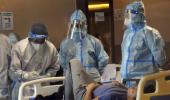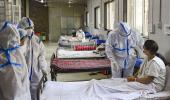All India Institutes of Medical Sciences director Randeep Guleria on Monday said it is better to identify mucormycosis by its name rather than by the colour as labelling the same fungus with names of different colors can create confusion.

Addressing a press conference by the Union health ministry, he clarified that no definite link of mucormycosis has been seen with oxygen therapy.
“Many patients taking treatment at home, who were not on oxygen therapy, have also been found to get infected with mucormycosis. So there is no definite link between oxygen therapy and catching the infection,” he said.
Guleria underlined that it is better not to use the term ‘black fungus' while talking about mucormycosis, as it leads to a lot of avoidable confusion.
"Labelling the same fungus with names of different colors can create confusion. Mucormycosis is not a communicable disease, unlike COVID-19. About 90-95 per cent of patients getting infected with mucormycosis are found to have been either diabetic and/or taking steroids. This infection is seen very rarely in those who are neither diabetic nor taking steroids," he said.
The official said in general, there are various types of fungal infections such as candida, aspergillosis, cryptococcus, histoplasmosis and coccidioidomycosis. Mucormycosis, candida and aspergillosis are the ones observed more in those with low immunity, he said.
Speaking about the prevalence of these infections, he noted, “Candida fungal infection can manifest with symptoms such as white patches in the mouth, oral cavities and tongue. It can infect private parts and can also be found in the blood (in which case it can become serious).
“Aspergillosis, which is relatively not common, affects and invades lungs by creating cavities in the lungs. What is observed in COVID-19 is mostly mucormycosis; aspergillosis is observed occasionally, and Candida in some people,” he explained.
On challenges faced in treating mucormycosis, Guleria said anti-fungal treatment goes on for many weeks so it is proving to be challenging for hospitals, since COVID-19 positive and negative patients who catch mucormycosis need to be housed in separate hospital wards.
Surgery also needs to be done judiciously since aggressive surgery for mucormycosis can have adverse outcomes for COVID-19 patients, he said.
"Maintaining proper hygiene is very important for diabetic patients since the chances of opportunistic infection are very high in such patients. Those using oxygen concentrators should ensure cleaning of humidifiers regularly," he said.
Asked about the impact of the third wave of COVID-19 on children, the AIIMS Delhi chief said there is so far no evidence that there will be severe infection among children or more cases among them in the upcoming wave of COVID-19.
He, however, said children have suffered collateral damage due to gender gap in education, stress, mental issues, smartphone dependence and addiction, and interrupted educational opportunities.
"If we see the data of the first and second wave, it is very similar and it shows that children are usually protected and even if they get it, they only have mild infection. And the virus has not changed so there is no indication that children will be more affected in the third wave," he said.
According to AIIMS data, Guleria said, it has been seen that the deaths due to the disease according to the age group and comorbidities were similar in the first and second waves.
The official said as COVID-19 recovery rate is improving, there is post-Covid sequelae.
"If your symptoms remain for over 12 weeks then it is called post-Covid syndrome or long Covid and that needs treatment too. Common symptoms of it are breathing difficulties, cough, tightness in chest, anxiety and high pulse rate. These symptoms can remain because of body's immune response to inflammation," he said.
"There is also chronic fatigue syndrome and it needs symptomatic treatment. Another is brain fog when people who have recovered from Covid have difficulty in concentrating and find it difficult to work and they also suffer from insomnia and depression. All these require rehabilitation and as our recovery rate will rise, we will need that multi-disciplinary post-Covid clinics are developed where there is rehabilitation and they can do yoga for feeling of well being," he added.
In response to a question on states being unable to procure Moderna and Pfizer vaccines, Lav Agarwal, Joint Secretary, health ministry, said "Whether it is Pfizer or Moderna, at the central level, we have been coordinating with them and are facilitating them in two ways - one is the regulatory facilitation in terms of approval and second is procurement related facilitation.
“Also, order book of both Pfizer and Moderna is full so it depends on their surplus that how much they can provide in India... they will come back on it to the Centre and we will help in facilitation to states," he said.
Agarwal said a steady decline in daily new COVID-19 cases has been observed in the country since the last 17 days.
"There has been a 2.6 times increase in Covid tests across the country in the past 15 weeks, while a steady decline in weekly case positivity rate since the last two weeks has been noted. The weekly positivity has declined from 20.28 per cent recorded between April 20-26 to 12.09 per cent recorded between May 18 to 24," he said.











 © 2025
© 2025